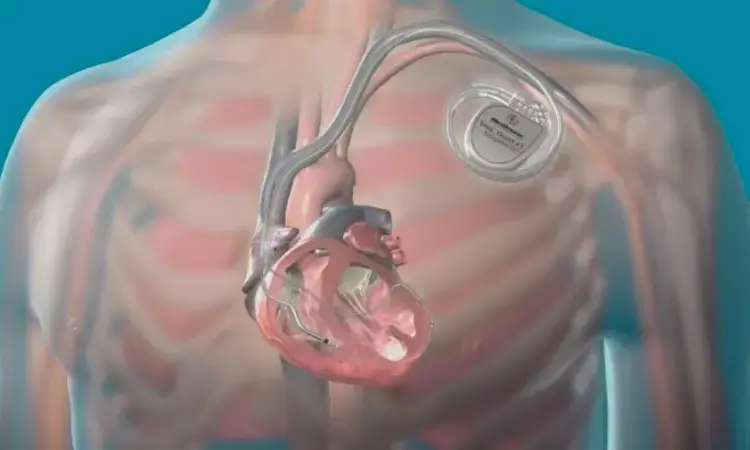- Home
- Medical news & Guidelines
- Anesthesiology
- Cardiology and CTVS
- Critical Care
- Dentistry
- Dermatology
- Diabetes and Endocrinology
- ENT
- Gastroenterology
- Medicine
- Nephrology
- Neurology
- Obstretics-Gynaecology
- Oncology
- Ophthalmology
- Orthopaedics
- Pediatrics-Neonatology
- Psychiatry
- Pulmonology
- Radiology
- Surgery
- Urology
- Laboratory Medicine
- Diet
- Nursing
- Paramedical
- Physiotherapy
- Health news
- Fact Check
- Bone Health Fact Check
- Brain Health Fact Check
- Cancer Related Fact Check
- Child Care Fact Check
- Dental and oral health fact check
- Diabetes and metabolic health fact check
- Diet and Nutrition Fact Check
- Eye and ENT Care Fact Check
- Fitness fact check
- Gut health fact check
- Heart health fact check
- Kidney health fact check
- Medical education fact check
- Men's health fact check
- Respiratory fact check
- Skin and hair care fact check
- Vaccine and Immunization fact check
- Women's health fact check
- AYUSH
- State News
- Andaman and Nicobar Islands
- Andhra Pradesh
- Arunachal Pradesh
- Assam
- Bihar
- Chandigarh
- Chattisgarh
- Dadra and Nagar Haveli
- Daman and Diu
- Delhi
- Goa
- Gujarat
- Haryana
- Himachal Pradesh
- Jammu & Kashmir
- Jharkhand
- Karnataka
- Kerala
- Ladakh
- Lakshadweep
- Madhya Pradesh
- Maharashtra
- Manipur
- Meghalaya
- Mizoram
- Nagaland
- Odisha
- Puducherry
- Punjab
- Rajasthan
- Sikkim
- Tamil Nadu
- Telangana
- Tripura
- Uttar Pradesh
- Uttrakhand
- West Bengal
- Medical Education
- Industry
Carvedilol better at lowering risk of arrhythmias among recipients of ICD compared to metaprolol

USA: Carvedilol can significantly reduce the risk of atrial arrhythmias (ATA) when compared to metoprolol in heart failure (HF) patients with implantable cardioverter-defibrillator (ICD), a recent study published in JACC: Clinical Electrophysiology has revealed.
Both nonselective and selective beta-blockers are used for the treatment of HF patients. However, the data is limited on the association of beta-blocker type with the risk of ventricular arrhythmia (VA) and atrial arrhythmia in heart failure patients with a primary prevention implantable cardioverter-defibrillator.
To shed light on the same, Dr Mehmet K. Aktas, University of Rochester Medical Center, Rochester, New York, USA, and colleagues sought to evaluate the effect of metoprolol versus carvedilol on the risk of atrial tachyarrhythmia and VA in HF patients with an ICD.
For this purpose, the researchers pooled primary prevention ICD recipients from 5 landmark ICD trials (RAID, MADIT-RISK, MADIT-RIT, MADIT-CRT, and MADIT-II). The risk of ATA, fast VA (defined as ventricular tachycardia ≥200 beats/min or ventricular fibrillation), and inappropriate ICD shocks by beta-blocker type were evaluated using Fine and Gray multivariate regression models, stratified by study.
The study revealed the following findings:
- Among 4,194 patients, 70% were prescribed carvedilol and 30% metoprolol.
- The cumulative incidence of ATA at 3.5 years was 11% in patients treated with carvedilol versus 15% in patients taking metoprolol.
- Multivariate analysis showed that carvedilol treatment was associated with a 35% reduction in the risk of ATA (HR: 0.65) when compared to metoprolol and with a corresponding 35% reduction in the risk of inappropriate ICD shocks (HR: 0.65).
- Carvedilol versus metoprolol was also associated with a 16% reduction in the risk of fast VA. However, these findings did not reach statistical significance (HR: 0.84).
The retrospective study of HF patients with primary prevention ICDs reveals that those who are treated with carvedilol experience a significantly lower risk of inappropriate ICD shocks and ATA versus those treated with metoprolol. The researchers also observed a trend toward a reduction of risk of fast VA among patients treated with carvedilol versus metoprolol.
"This study adds to the accumulating evidence indicating that patients taking carvedilol seem to do better than those taking metoprolol," the researchers wrote.
The limitation is that the examined studies were not designed to compare the outcomes of patients on carvedilol to those on metoprolol and the patients in these studies were not receiving present-day therapies such as sodium-glucose cotransporter-2 inhibitors and sacubitril/valsartan.
The researchers, therefore, conclude that "there is a need for further studies to prospectively evaluate the effect of metoprolol and carvedilol on arrhythmic outcomes in the contemporary era."
Reference:
Effect of Carvedilol vs Metoprolol on Atrial and Ventricular Arrhythmias Among Implantable Cardioverter-Defibrillator Recipients. JACC Clin Electrophysiol 2023; Aug 30:[Epublished].
Dr Kamal Kant Kohli-MBBS, DTCD- a chest specialist with more than 30 years of practice and a flair for writing clinical articles, Dr Kamal Kant Kohli joined Medical Dialogues as a Chief Editor of Medical News. Besides writing articles, as an editor, he proofreads and verifies all the medical content published on Medical Dialogues including those coming from journals, studies,medical conferences,guidelines etc. Email: drkohli@medicaldialogues.in. Contact no. 011-43720751


